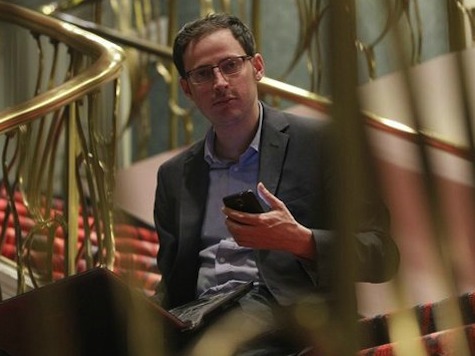Nate Silver, the New York Times‘ political number-cruncher, has earned his bragging rights after schooling conservative pollsters in the 2012 presidential election. However, his attempted “debunking” of one aspect of the IRS scandal is nothing of the sort.
There are two claims in the IRS scandal: one, that the agency singled out conservative organizations applying for non-profit status; two, that the agency also audited individuals and organizations because of their prominent involvement in opposition politics.
(There is, arguably, a third claim: that the agency lied to Congress–a claim that is evident after this week’s IRS testimony in Congress.)
The IRS has already admitted the first claim, and the second claim was mentioned by Peggy Noonan in her weekly column in the Wall Street Journal.
Silver takes Noonan on, arguing that her proof is only “anecdotal,” and that those conservatives who claim to have been audited for political reasons were statistically likely to have been audited anyway:
Ms. Noonan is surely correct that many conservative taxpayers were audited. In fact, based on some simple math that I’ll present in a moment, it’s likely that hundreds of thousands of Mitt Romney voters were selected for an audit in 2012.
However, it’s also likely that hundreds of thousands of Mr. Obama’s supporters were audited….
[E]ven with no political targeting at all, hundreds of thousands of conservative voters would have been chosen for audits in the I.R.S.’s normal course of business. Among these hundreds of thousands of voters, thousands would undoubtedly have gone beyond merely voting to become political activists.
The fact that Ms. Noonan has identified four conservatives from that group of thousands provides no evidence at all toward her hypothesis.
The telling omission in Silver’s post is that he cannot prove that these conservatives–some of whom were subjected to several audits at once–weren’t audited for political reasons. The fact that some were statistically more likely to have been audited (once) for ordinary reasons does not mean that they were not audited for political reasons.
In fact, it is precisely the unlikely nature of some of these audits that has led to legitimate suspicion of the IRS’s motives.
Consider Noonan’s account of what happened to Romney donor Frank VanderSloot: “He found himself last June, for the first time in 30 years, the target of IRS auditors. His wife and his business were also soon audited.” Were his wife and business also statistically likely to have been chosen?
Or consider the case of Catherine Engelbrecht, described by Breitbart News’ Brandon Darby:
The group received an unprecedented level of scrutiny from the IRS since its original application for 501(c3) status was filed in 2010. The IRS sent rounds of questions over several years that went as far as demanding to see each and every tweet Engelbrecht had ever sent out and each and every speech she had ever given.
The IRS did not stop there. They demanded to know who had spoken at the group and to see each and every speech the speakers had given. They demanded to know the identities of all members of the group and who had attended their meetings. The list of probing and outlandish questions was exhaustive.
Soon, the IRS began to audit Engelbrecht’s family business and her personally. And the scrutiny from the federal government did not stop with the IRS.
Two DOJ agencies, the Federal Bureau of Investigation (FBI) and the Bureau of Alcohol, Tobacco, and Firearms (ATF) began to make their presence felt in Engelbrecht’s life as well.
In Engelbrecht’s case, the IRS audit appears to have been directly connected to its application for nonprofit status. The multiple, simultaneous investigations also prompt questions about the targeting of conservatives by a broader set of government agencies.
Of course, not everyone who is audited by the IRS has been targeted for political reasons. The idea that some may have been singled out risks becoming an all-too-convenient excuse for those who, in fact, have not filed or paid their taxes properly–or those who simply fall into the net as “false positives.”
It is probably true that some of those conservatives who now claim to have been targeted by the IRS for audit simply weren’t. But Silver’s statistical argument does not dispose of all of those claims–and the proof offered by Noonan and Darby, while “anecdotal,” is highly compelling.
Moreover, the fact that so many people are audited in any given year may have allowed the IRS to believe that its alleged political targeting of conservatives would go unnoticed, or that its bad motives would be very difficult to prove, given the very arguments Silver uses.
At the very least, these cases call for more investigation–as even Silver seems to acknowledge, noting that “evidence could yet emerge that there was targeting of politically active individual taxpayers.”
At most, his analysis is a caution against generalizing from those few examples. It certainly does not resolve them.

COMMENTS
Please let us know if you're having issues with commenting.